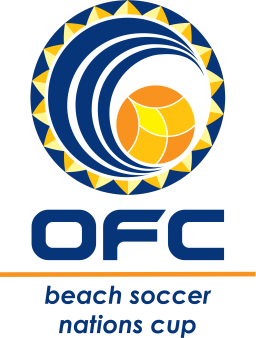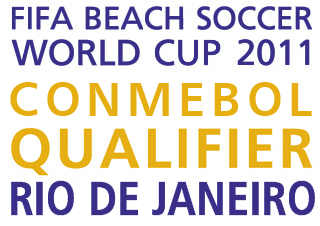The FIFA Club World Cup is an international men's association football competition organised by the Fédération Internationale de Football Association (FIFA), the sport's global governing body. The competition was first contested in 2000 as the FIFA Club World Championship. It was not held from 2001 to 2004 due to a combination of factors in the cancelled 2001 tournament, most importantly the collapse of FIFA's marketing partner International Sport and Leisure (ISL), but since 2005 it has been held every year, and has been hosted by Brazil, Japan, the United Arab Emirates, Morocco and Qatar. Views differ as to the cup's prestige: it struggles to attract interest in most of Europe, and is the object of heated debate in South America.
The FIFA Beach Soccer World Cup is an international beach soccer competition contested by the national teams of the member associations of FIFA, the sport's global governing body. The tournament was preceded by the Beach Soccer World Championships established in 1995 which took place every year for the next decade under the supervision of Beach Soccer Worldwide (BSWW) and its predecessors. FIFA joined hands with BSWW in 2005 to take over the organization of the competition, re-branding it as an official FIFA tournament.

Beach soccer, also known as beach football, sand football or beasal, is a variant of association football played on a beach or some form of sand.

The 2005 FIFA Beach Soccer World Cup was the first edition of the FIFA Beach Soccer World Cup, an international beach soccer competition contest by men's national teams and organized by FIFA. Overall, it was the 11th edition of a world cup in beach soccer since its establishment with the first Beach Soccer World Championships in 1995. It took place in at Copacabana Beach in Rio de Janeiro, Brazil, between 8 and 15 May.
The Beach Soccer World Championships was the premier international beach soccer competition contested by men's national teams between 1995 and 2004. It was replaced by the FIFA Beach Soccer World Cup.

The 2006 FIFA Beach Soccer World Cup was the second edition of the FIFA Beach Soccer World Cup, governed by FIFA. Overall, this was the 12th edition of a world cup in beach soccer since the establishment of the Beach Soccer World Championships which ran from 1995–2004 but was not governed by FIFA. It took place in Rio de Janeiro, Brazil, from 2–12 November 2006.

The OFC Beach Soccer Nations Cup is the main championship for beach soccer in Oceania, contested between the senior men's national teams of the members of the Oceania Football Confederation (OFC). It is the sport's version of the better known OFC Nations Cup in association football.

The 2007 FIFA Beach Soccer World Cup was the third edition of the FIFA Beach Soccer World Cup, governed by FIFA. Overall, this was the 13th edition of a world cup in beach soccer since the establishment of the Beach Soccer World Championships which ran from 1995 to 2004 but was not governed by FIFA. It took place in Rio de Janeiro, Brazil, from 2–11 November 2007.
The 2001 Beach Soccer World Championships was the seventh edition of the Beach Soccer World Championships, the most prestigious competition in international beach soccer contested by men's national teams until 2005, when the competition was then replaced by the second iteration of a world cup in beach soccer, the better known FIFA Beach Soccer World Cup. It was organised by Brazilian sports agency Koch Tavares.

The 1995 Beach Soccer World Championships was the first edition of the Beach Soccer World Championships, the most prestigious competition in international beach soccer contested by men's national teams until 2005, when the competition was then replaced by the second iteration of a world cup in beach soccer, the better known FIFA Beach Soccer World Cup. It was organised by Brazilian sports agency Koch Tavares.
The 1996 Beach Soccer World Championships was the second edition of the Beach Soccer World Championships, the most prestigious competition in international beach soccer contested by men's national teams until 2005, when the competition was then replaced by the second iteration of a world cup in beach soccer, the better known FIFA Beach Soccer World Cup. It was organised by Brazilian sports agency Koch Tavares.
The 1997 Beach Soccer World Championships was the third edition of the Beach Soccer World Championships, the most prestigious competition in international beach soccer contested by men's national teams until 2005, when the competition was then replaced by the second iteration of a world cup in beach soccer, the better known FIFA Beach Soccer World Cup. It was organised by Brazilian sports agency Koch Tavares.
The 1998 Beach Soccer World Championships was the fourth edition of the Beach Soccer World Championships, the most prestigious competition in international beach soccer contested by men's national teams until 2005, when the competition was then replaced by the second iteration of a world cup in beach soccer, the better known FIFA Beach Soccer World Cup. It was organised by Brazilian sports agency Koch Tavares.
The 2000 Beach Soccer World Championships was the sixth edition of the Beach Soccer World Championships, the most prestigious competition in international beach soccer contested by men's national teams until 2005, when the competition was then replaced by the second iteration of a world cup in beach soccer, the better known FIFA Beach Soccer World Cup. It was organised by Brazilian sports agency Koch Tavares.

The 2003 Beach Soccer World Championships was the ninth edition of the Beach Soccer World Championships, the most prestigious competition in international beach soccer contested by men's national teams until 2005, when the competition was then replaced by the second iteration of a world cup in beach soccer, the better known FIFA Beach Soccer World Cup. It was organized by Brazilian sports agency Koch Tavares in cooperation with and under the supervision of Beach Soccer Worldwide (BSWW), the sports governing body.
The 2004 Beach Soccer World Championships was the tenth and final edition of the Beach Soccer World Championships, the most prestigious competition in international beach soccer contested by men's national teams; the following year, the competition was replaced by the second iteration of a world cup in beach soccer, the better known FIFA Beach Soccer World Cup. It was organized by Brazilian sports agency Koch Tavares in cooperation with and under the supervision of Beach Soccer Worldwide (BSWW), the sports governing body.

The 2011 FIFA Beach Soccer World Cup was the sixth edition of the FIFA Beach Soccer World Cup, governed by FIFA. Overall, this was the 16th edition of a world cup in beach soccer since the establishment of the Beach Soccer World Championships which ran from 1995–2004 but was not governed by FIFA. It took place at the Stadio del Mare, a temporary stadium at the Marina di Ravenna in Ravenna, Italy, the third tournament to take place outside Brazil, which started on September 1 and ended on September 11, 2011. However this was the first tournament to take place under the new two year basis; now the FIFA Beach Soccer World Cup takes place once every two years. The tournament was confirmed in March 2010.

The 2011 FIFA Beach Soccer World Cup CONMEBOL qualifier, also later and commonly known as the 2011 South American Beach Soccer Championship, was the fourth Beach Soccer World Cup qualification championship for South America, held from July 31– August 7 on Copacabana beach in Rio de Janeiro, Brazil. The tournament was originally scheduled to take place from 7 – 14 May 2011.
The 2005 CONCACAF and CONMEBOL Beach Soccer Championship, also known as the 2005 FIFA Beach Soccer World Cup qualifiers for (CONCACAF and CONMEBOL), was the first beach soccer championship for the Americas, held in March 2005, in Rio de Janeiro, Brazil. Hosts Brazil won the championship, beating Uruguay in the final, whilst the United States beat Argentina in the third place play off to finish third and fourth respectively. These nations moved on to play in the 2005 FIFA Beach Soccer World Cup in Rio de Janeiro from May 8 to May 15.
The 2005 FIFA Beach Soccer World Cup qualification playoffs for (UEFA) was a special, one-off beach soccer tournament to determine the fourth European nation that would be competing in the 2005 FIFA Beach Soccer World Cup. The tournament started two days before the start of the world cup, ending the day before the opening match, from May 6 - May 7, 2005, in Rio de Janeiro, Brazil. The winners of the playoffs were Spain.








